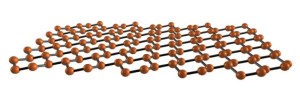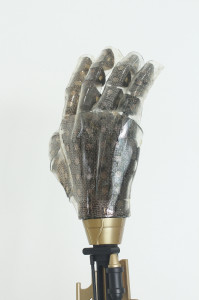
Researchers have created the first transistor out of silicene, the world’s thinnest silicon material.
Image: University of Texas at Austin
There’s an exciting new development in the world of single-atom thick materials, and surprisingly it doesn’t revolve around graphene.
Instead, scientist have shifted their attention to silicene: an exotic form of silicon that has fantastic electrical properties for computer chips.
Like graphene, silicene is a single-atom thick material that allows electrons to flow through it at amazingly high speeds. However, silicene does not occur naturally like graphene – it instead has to be grown in the lab on a sheet of silver.
Because of the difficulty encountered when attempting to produce silicene, its properties have only been theoretical until now. Recently, Deji Akinwande of the University of Texas at Austin turned his attention to this material and found a way to make a transistor out of silicene.


